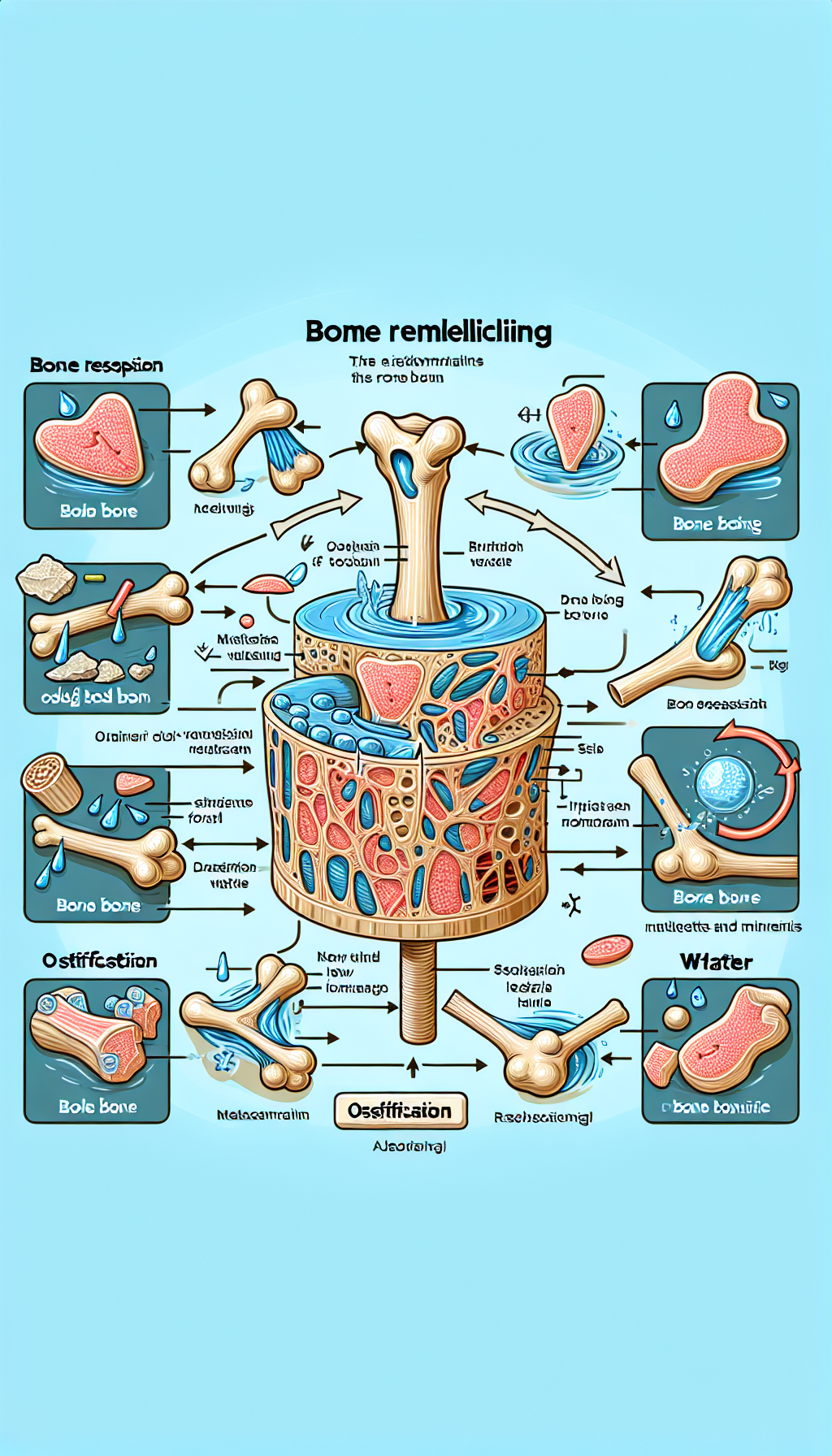Water is the elixir of life, essential for the survival of all known forms of life, and it plays a particularly critical role in maintaining bone health. While most people are aware of the need for nutrients like calcium and vitamin D for healthy bones, hydration is often an overlooked aspect of bone health. This comprehensive article delves into the significance of hydration for maintaining strong and healthy bones, explores the mechanisms by which water affects bone tissue, and provides practical advice for optimizing your hydration for bone health.
Hydration and Bone Density: A Crucial Connection
Bone tissue is a living matrix, constantly being remodeled and shaped by various factors, including hydration. Adequate hydration is vital for maintaining the right balance of nutrients and minerals in the bones. When the body is well-hydrated, nutrients can travel more efficiently through the bloodstream to the bones. Furthermore, hydration aids in the elimination of waste products from the metabolic processes within the bone cells, thus supporting overall bone density and health.
The Role of Water in Nutrient Transport and Waste Removal
Water facilitates the transport of essential minerals, such as calcium and phosphorus, which are crucial for bone formation and strength. It also helps to dissolve these minerals, making them more accessible for absorption and utilization by the body. Moreover, water aids in the removal of toxins that can accumulate in the bone matrix, which could potentially interfere with bone strength and density.
For deeper insights into the role of specific nutrients in bone health, consider exploring Bone Health, which provides a comprehensive overview of the various factors contributing to bone density and strength.
The Impact of Dehydration on Bone Health
Dehydration can have immediate and long-term effects on bone health. When the body lacks sufficient water, it may resort to drawing fluids from the bones, leading to a decrease in bone strength and an increased risk of fractures. Additionally, chronic dehydration can impair the body’s ability to absorb and utilize calcium, further compromising bone integrity.
Understanding the Bone Remodeling Process
Bone remodeling is a dynamic process involving the resorption of old bone and the formation of new bone. This process is highly dependent on a well-functioning vascular system, which in turn relies on adequate hydration. Dehydration can disrupt this process, leading to weaker bones and increasing the likelihood of osteoporosis and other bone-related conditions.
Best Practices for Hydration and Bone Health
To ensure optimal bone health, it’s important to maintain a consistent intake of fluids throughout the day. The amount of water needed can vary based on factors like age, gender, climate, and physical activity levels. However, a general guideline is to drink at least eight 8-ounce glasses of water per day, with additional intake during exercise or hot weather.
Tips for Staying Hydrated
- Start your day with a glass of water to kickstart hydration after the overnight fast.
- Keep a reusable water bottle with you throughout the day to encourage regular sipping.
- Incorporate water-rich foods into your diet, such as fruits and vegetables.
- Monitor the color of your urine; it should be pale yellow, indicating proper hydration.
The Synergy of Exercise, Diet, and Hydration for Bone Health
Exercise is another crucial component of maintaining bone density. Weight-bearing and resistance exercises stimulate bone formation and help retain bone mass. When combined with proper hydration, the benefits of exercise are enhanced, as water helps to maintain the elasticity of connective tissues and provides the necessary fluidity for joint movements.
Diet: A Foundation for Bone Health
A balanced diet that includes adequate amounts of calcium, vitamin D, magnesium, and other bone-supporting nutrients is essential. Hydration plays a key role in facilitating the digestive process, allowing these nutrients to be absorbed more effectively by the body.
For a closer look at how diet influences bone density, consider reading about Evaluating the Impact of Marine Nutrients on Bone Health and the importance of Calcium and Vitamin D for Bone Health in Vegan Diets.
Advanced Hydration: Understanding Electrolytes and Bone Health
Electrolytes such as sodium, potassium, and magnesium are crucial for maintaining fluid balance within the body and are particularly important for bone health. They help regulate the acidity of the blood (pH), which is important for bone density as bones may release minerals to balance pH levels when necessary.
The Importance of Balanced Electrolyte Intake
An imbalance in electrolytes can affect bone health. For example, excessive sodium intake can lead to calcium excretion through urine, while insufficient magnesium can impair vitamin D metabolism, which is critical for calcium absorption.
For an in-depth understanding of the interplay between electrolytes and bone health, take a look at the article on Understanding the Link Between Bone Health and Electrolyte Balance.
Hydration and Bone Health in Special Populations
Certain populations, such as athletes, the elderly, and postmenopausal women, may have specific hydration needs when it comes to bone health. Athletes need to replace fluids lost through sweat, the elderly may have a diminished thirst response, and postmenopausal women may require more fluids to help maintain bone density due to hormonal changes.
Strategies for Hydration in Special Cases
- Athletes: Implement a hydration strategy that includes drinking fluids before, during, and after exercise.
- Elderly: Set reminders to drink water and consume moisture-rich foods.
- Postmenopausal Women: Pay special attention to fluid intake and consider hydration-enhancing supplements.
External Resources for Further Reading
To supplement the information provided here, readers may find the following external resources helpful:
- A study on the link between hydration and bone density which provides scientific insights into the connection.
- An in-depth guide on electrolytes and their roles in the body, including their impact on bones.
- A resource on hydration strategies for athletes, which is particularly useful for those looking to optimize their bone health through exercise.
Conclusion
Hydration is a foundational aspect of bone health that is often overlooked. By understanding the role that water plays in maintaining bone density and strength, individuals can take proactive steps to ensure they are properly hydrated. Incorporating adequate water intake into a lifestyle that includes a balanced diet and regular exercise can help to build and maintain healthy bones throughout life. Remember, when it comes to bone health, every sip counts.



